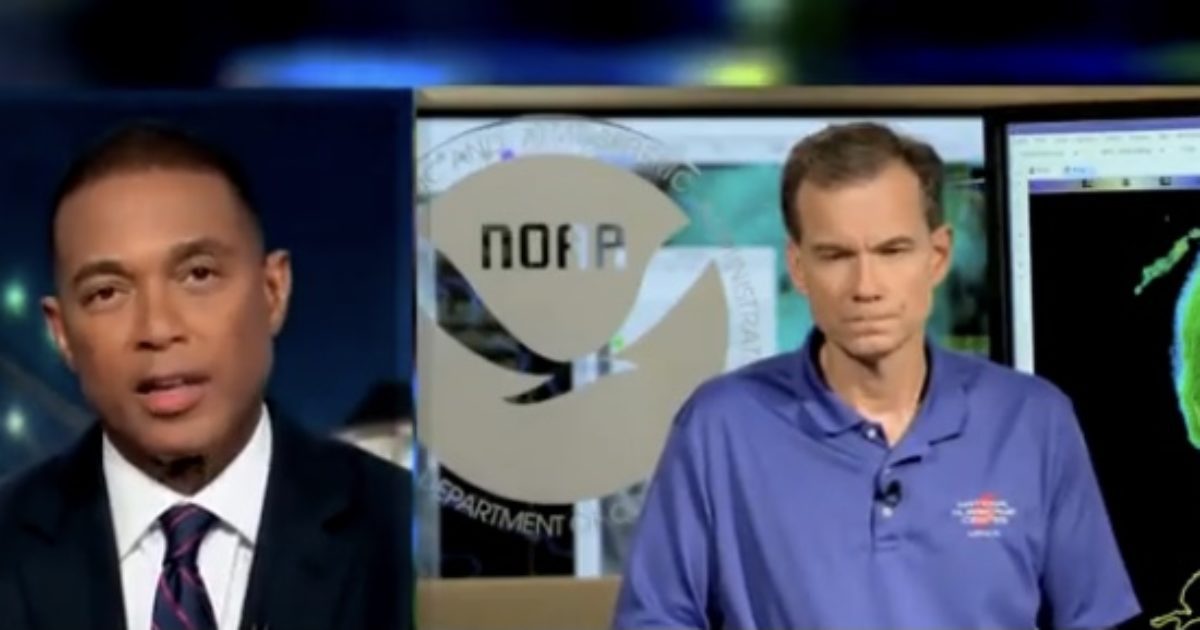Time for a flashback!
CNN’s Don Lemon last week got schooled by a British Royal commentator on the history of African slavery when he brought up reparations.
Lemon also recently got demoted to a daytime panel.
President Trump wrote a celebratory post on Truth Social about Lemon’s recent departure from primetime television.
Trump celebrates Don Lemon 'firing': ‘A small step for television, a giant step for mankind’https://t.co/G4cCQS6HyK
— RSBN 🇺🇸 (@RSBNetwork) September 20, 2022
RSBN wrote:
“A small step for television, a giant step for mankind,” Trump quipped. “Don Lemon, often called ‘the dumbest man on television’ having made even Lebron James look smart during their interview two years ago, has been FIRED from his prime time evening spot on CNN – extremely low ratings – and will be thrown into their ‘Death Valley’ morning show.”
Lemon, who hosted the CNN show “Don Lemon Tonight,” addressed his departure from primetime television in September, claiming that he was “presented with an opportunity that I can’t pass up at this network.”
However, Trump had a different view on the story. “I assume this means a BIG salary cut prior to his Complete & Total future firing from Ratings Challenged (to put it mildly!) CNN,” the president continued. “Good luck Don, you’ll need it! MAGA!”
Funnily enough, Trump’s comments come just after Lemon was creamed for inflammatory comments about slave reparations during an on-air broadcast from London where the former primetime host was covering the funeral proceedings for the late Queen Elizabeth II.
Things got worse for CNN's chief propagandist.
Lemon got demolished in front of a national audience for blaming Hurricane Ian on global warming.
The NOAA Director Jamie Rohme was having none of it.
Here's the transcript:
Don Lemon: Can you tell us what this is and climate change has on this phenomenon?
Jaime Rohme: We can come back and talk about climate change at a later time. I want to focus on the here and now…
Don Lemon: What effect does climate change have on this phenomenon that is happening now? Because it seems these storms are intensifying. That’s a question.
Jaime Rohme: I don’t think you can link climate change to any one event. on a whole, on an accumulative, climate change may be making storms worse. But to link it to any one event, I would caution against that.
Lemon got lectured again.
WATCH:
https://twitter.com/__Pfeiffer/status/1574947016978812928?ref_src=twsrc%5Etfw%7Ctwcamp%5Etweetembed%7Ctwterm%5E1574947016978812928%7Ctwgr%5E07a30362b755db76f0e1da9946b6944730761a09%7Ctwcon%5Es1_&ref_url=https%3A%2F%2Fwww.thegatewaypundit.com%2F2022%2F09%2Fcnns-don-lemon-tries-blame-hurricane-ian-global-warming-gets-schooled-noaa-hurricane-director-video%2F
Hurricanes are NOT bigger, stronger, and more dangerous today than in previous centuries.
Roger Pielke at Forbes reported:
From 1900 to 1958, the first half of the period under study, NOAA reports that there were 117 total hurricanes that struck the mainland U.S.. But in contrast, G19 has only 92. They are missing 25 hurricanes. In the second half of the dataset, from 1959 to 2017, NOAA has 91 hurricanes that struck the U.S., and G19 has 155, that is 64 extra hurricanes.
The AP passed along the incorrect information when it reported that the new study looks at “247 hurricanes that hit the U.S. since 1900.” According to NOAA, from 1900 to 2017 there were in fact only 197 hurricanes that made 208 unique landfalls (9 storms had multiple landfalls).
Part of this difference can be explained by the fact that G19 focus on economic damage, not hurricanes. If a hurricane from early in the 20th century resulted in no reported damage, then according to G19 it did not exist. That’s one reason why we don’t use economic data to make conclusions about climate. A second reason for the mismatched counts is that G19 counts many non-hurricanes as hurricanes, and disproportionately so in the second half of the dataset.
The mismatch between hurricane counts in G19 versus those of NOAA by itself calls into question the entire paper. But it gets much worse.
The dataset on losses from hurricanes used by G19 to generate its top-line conclusions is based on my research. That dataset has been maintained by a company called ICAT located in Colorado. The ICAT dataset was initially created about a decade ago by a former student and collaborator of mine, Joel Gratz, based entirely on our 2008 hurricane loss dataset (which I’ll call P08).
"Hurricanes are not more frequent today than they were a century ago – no matter how long you manipulate the data," The Gateway Pundit noted.

*Image from The Gateway Pundit*



Join the conversation!
Please share your thoughts about this article below. We value your opinions, and would love to see you add to the discussion!